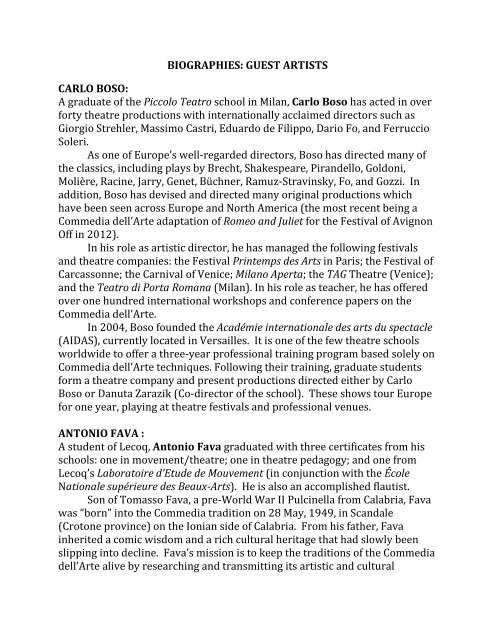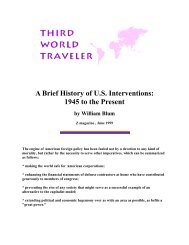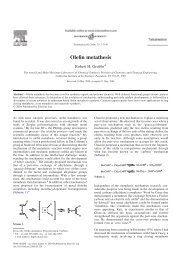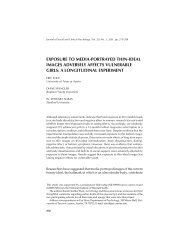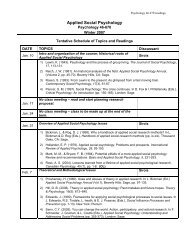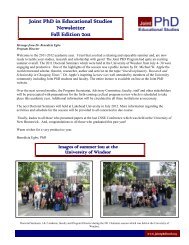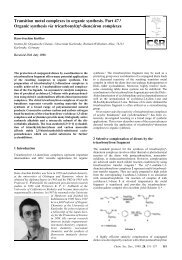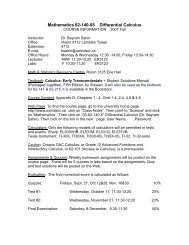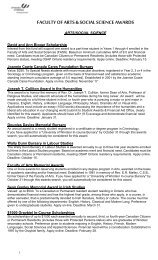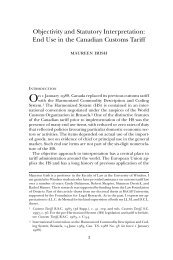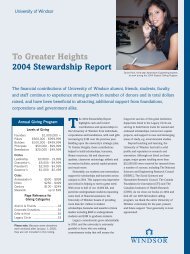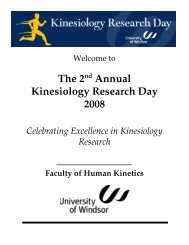GUEST ARTISTS CARLO BOSO - University of Windsor
GUEST ARTISTS CARLO BOSO - University of Windsor
GUEST ARTISTS CARLO BOSO - University of Windsor
You also want an ePaper? Increase the reach of your titles
YUMPU automatically turns print PDFs into web optimized ePapers that Google loves.
BIOGRAPHIES: <strong>GUEST</strong> <strong>ARTISTS</strong><br />
<strong>CARLO</strong> <strong>BOSO</strong>:<br />
A graduate <strong>of</strong> the Piccolo Teatro school in Milan, Carlo Boso has acted in over<br />
forty theatre productions with internationally acclaimed directors such as<br />
Giorgio Strehler, Massimo Castri, Eduardo de Filippo, Dario Fo, and Ferruccio<br />
Soleri.<br />
As one <strong>of</strong> Europe’s well-regarded directors, Boso has directed many <strong>of</strong><br />
the classics, including plays by Brecht, Shakespeare, Pirandello, Goldoni,<br />
Molière, Racine, Jarry, Genet, Büchner, Ramuz-Stravinsky, Fo, and Gozzi. In<br />
addition, Boso has devised and directed many original productions which<br />
have been seen across Europe and North America (the most recent being a<br />
Commedia dell’Arte adaptation <strong>of</strong> Romeo and Juliet for the Festival <strong>of</strong> Avignon<br />
Off in 2012).<br />
In his role as artistic director, he has managed the following festivals<br />
and theatre companies: the Festival Printemps des Arts in Paris; the Festival <strong>of</strong><br />
Carcassonne; the Carnival <strong>of</strong> Venice; Milano Aperta; the TAG Theatre (Venice);<br />
and the Teatro di Porta Romana (Milan). In his role as teacher, he has <strong>of</strong>fered<br />
over one hundred international workshops and conference papers on the<br />
Commedia dell’Arte.<br />
In 2004, Boso founded the Académie internationale des arts du spectacle<br />
(AIDAS), currently located in Versailles. It is one <strong>of</strong> the few theatre schools<br />
worldwide to <strong>of</strong>fer a three-year pr<strong>of</strong>essional training program based solely on<br />
Commedia dell’Arte techniques. Following their training, graduate students<br />
form a theatre company and present productions directed either by Carlo<br />
Boso or Danuta Zarazik (Co-director <strong>of</strong> the school). These shows tour Europe<br />
for one year, playing at theatre festivals and pr<strong>of</strong>essional venues.<br />
ANTONIO FAVA :<br />
A student <strong>of</strong> Lecoq, Antonio Fava graduated with three certificates from his<br />
schools: one in movement/theatre; one in theatre pedagogy; and one from<br />
Lecoq’s Laboratoire d’Etude de Mouvement (in conjunction with the École<br />
Nationale supérieure des Beaux-Arts). He is also an accomplished flautist.<br />
Son <strong>of</strong> Tomasso Fava, a pre-World War II Pulcinella from Calabria, Fava<br />
was “born” into the Commedia tradition on 28 May, 1949, in Scandale<br />
(Crotone province) on the Ionian side <strong>of</strong> Calabria. From his father, Fava<br />
inherited a comic wisdom and a rich cultural heritage that had slowly been<br />
slipping into decline. Fava’s mission is to keep the traditions <strong>of</strong> the Commedia<br />
dell’Arte alive by researching and transmitting its artistic and cultural
heritage. To this end, he writes, acts, directs plays (Love is a Drug, Oxford<br />
Stage Company; Il Pozzo dei Furbi, Piccolo Theatre <strong>of</strong> Evanston-Chicago; La<br />
Flaminia Rapita and Le astuzie di Coviello, Teatro del Vicolo–ArscomicA)and<br />
operas (Rossini’s Il Turco; Pergolesi’s La Serva Padrona and Livietta e Tracollo;<br />
Banchieri’s La Saviezza Giovenile and Il Festino; Vecchi’s L’Amphiparnaso),<br />
plays music, creates Commedia masks, and organizes workshops all over the<br />
world, whether in Italian or Neapolitan, in the local idioms <strong>of</strong> Crotone or<br />
Reggio Emilia, in English, French, Spanish or Catalan. A master craftsman,<br />
Fava follows the ancient technique <strong>of</strong> mask making by pounding leather over a<br />
carved wooden matrix. He pays special homage to Dario Fo (actor, playwright<br />
and director) with whom he worked for many years.<br />
Although Fava has taught Commedia dell'Arte internationally, he has<br />
been particularly active in the UK, USA and Australia (in English), as well as in<br />
France, Canada and Switzerland (in French). Northwestern <strong>University</strong><br />
(Chicago) has printed a version <strong>of</strong> his lectures and workshops, and NWU Press<br />
has published his book, The Comic Mask in the Commedia dell’Arte (La<br />
Maschera Comica nella Commedia dell’Arte)―also available in Spanish and<br />
soon to be released in French (along with an experimental e-book version).<br />
In 1985 Fava founded his International School <strong>of</strong> the Comic Actor which<br />
specializes in training actors in its most noble, comic, theatrical form: the<br />
Commedia dell'Arte. He also re-established instruction in one <strong>of</strong> comedy’s<br />
greatest ancient forms: the Fabula Atellana. To promote the development <strong>of</strong><br />
these acting techniques, Fava developed masks and directed plays. In 1999,<br />
he invented the modern Commedia mask, Zanni Skinhead, making an<br />
important contribution to the evolution <strong>of</strong> the tradition.<br />
<strong>CARLO</strong>S GARCIA ESTEVEZ<br />
Founder and artistic leader <strong>of</strong> Teatro Punto and the director <strong>of</strong> Manifesto<br />
Poetico (International Laboratory <strong>of</strong> Theatre Research), Carlos Garcia<br />
Estevez trained with Jacques Lecoq for three years, both at his École<br />
Internationale de Théâtre and at his Laboratoire d’Etude de Mouvement (1997-<br />
99). He has been a guest teacher at LEM since 2012.<br />
Motivated by Lecoq, he began his life-long investigation <strong>of</strong> the tragic<br />
depth that resides in the Commedia dell’Arte. In 1999 he studied with Donato<br />
Sartori at the Centro Maschere e Strutture Gestuali (Padova). There he began<br />
his exploration <strong>of</strong> the architecture <strong>of</strong> gestures and the anthropology <strong>of</strong> the<br />
mask. A few years later, he collaborated with Donato Sartori as a movement<br />
teacher and actor.
Other artists with whom he trained include Gennadi Bogdanov, Pierre<br />
Byland, Eric de Bont, Antonio Fava, Kevin Crawford and Kaya Anderson.<br />
Estevez has worked with a number <strong>of</strong> important artists, such as Mario<br />
Gonzáles (Conservatoire Nationale de Art Dramatique, Paris; Théâtre du Soleil,<br />
Vincennes), José Luís Gómez (Teatro de La Abadía, Madrid) and Tapa Sudana<br />
(formerly with Peter Brook’s Parisian company).<br />
Estevez performed in A Dog’s Heart and The Magic Flute with Simon<br />
McBurney (director) He is currently touring his one-person performance<br />
piece, Solo dell’Arte, in Spain, France, Holland, Romania, Italy, Turkey, Cyprus,<br />
the UK, the USA and Canada.<br />
DR. DOMENICO PIETROPAOLO:<br />
A foremost authority in Italian Studies at the <strong>University</strong> <strong>of</strong> Toronto (Canada),<br />
Domenico Pietropaolo holds a PhD from this institution where he currently<br />
works today. A distinguished scholar, he is a former holder <strong>of</strong> the Goggio<br />
Chair in Italian Studies and is the Principal <strong>of</strong> St. Michael’s College. He has<br />
been Director both <strong>of</strong> the Department <strong>of</strong> Italian Studies and <strong>of</strong> the Graduate<br />
Centre for Study <strong>of</strong> Drama (now the Centre for Drama, Theatre and<br />
Performance Studies). He is cross-appointed with the Centre for Drama,<br />
Theatre and Performance Studies, the Centre for Medieval Studies, the Centre<br />
for Comparative Literature. Pietropaolo is the author <strong>of</strong> a number <strong>of</strong> books,<br />
including Goldoni and the Musical Theatre, The Performance Text, The Baroque<br />
Libretto, and The Science <strong>of</strong> Buffoonery, to name a few.<br />
He has written extensively on such topics as women in Commedia dell’<br />
Arte, performance conventions in the Commedia tradition, poetics <strong>of</strong><br />
theatrical dance, and the production history <strong>of</strong> early operas. He has spoken<br />
widely on the subjects <strong>of</strong> performance text and the impromptu tradition.<br />
JOHN RUDLIN<br />
The first drama department in the UK (at Exeter <strong>University</strong>) to be based on<br />
practice, rather than history or theory, was founded by John Rudlin. Using<br />
scientific laboratory courses as a model, Rudlin made studio work assessable;<br />
final examinations, for example, included a practical essay. Postgraduate<br />
qualifications also came to admit ‘research through practice.’ Courses were<br />
based on the ideas <strong>of</strong> French director Jacques Copeau and the study <strong>of</strong><br />
traditional forms, especially Commedia dell’Arte was central to them. A<br />
resulting study, Commedia dell’Arte, an actor’s handbook is regarded as an<br />
industry standard and has been reprinted by Routledge many times since it<br />
first appeared in 1994.
While teaching at Exeter, Rudlin considered it essential to continue his<br />
own practice and founded, with a group <strong>of</strong> graduates, Medium Fair Theatre, a<br />
touring community company which he directed for ten years before<br />
concentrating on theatre-in-education with an <strong>of</strong>fshoot called Fair Exchange.<br />
Besides acting, playwriting and designing, he has directed repertory, rural<br />
touring and Theatre-in-Education companies, and has mounted several major<br />
community plays.<br />
After twenty years <strong>of</strong> teaching, Exeter <strong>University</strong> finally allowed him<br />
sabbatical leave. Since most <strong>of</strong> his practical and pedagogical work had been<br />
based on that <strong>of</strong> Copeau, he used the time to write a monograph on him for the<br />
Cambridge series ‘Directors in Perspective.’ He subsequently co-authored<br />
Jacques Copeau: Texts on Theatre and has written chapters on various aspects<br />
<strong>of</strong> Coupeau’s work for compilation volumes.<br />
Leaving Exeter’s Drama Department with a top research rating and a<br />
massive undergraduate application rate, he emigrated to France to emulate<br />
Copeau, once more, by setting up a small rural centre for the dramatic arts.<br />
Centre Sélavy, an international centre for performance research, attracts<br />
students from all over the world. It was there and with these students that he<br />
was at last able to devote the time and attention to commedia dell’arte that<br />
the form demands. Now, theoretically retired, he is still writing books and<br />
plays, taking workshops and role-playing in learning environments.<br />
JOAN SCHIRLE<br />
As Director <strong>of</strong> Dell'Arte International (DAI) School <strong>of</strong> Physical Theatre (2000 –<br />
2010), Joan Schirle designed the curriculum for its accredited MFA in<br />
Ensemble-based Physical Theatre. A senior teacher <strong>of</strong> the FM Alexander<br />
Technique, she has devoted her research to the work <strong>of</strong> the actor as<br />
mover/creator. Schirle leads the DAI Bali study trip and has guest taught in<br />
MFA programs such as Yale, UCSD, U. Missouri/Kansas City, as well as for the<br />
artists <strong>of</strong> Cirque du Soleil; in 2012 she was invited to teach physical acting at<br />
the Beijing Dance Academy’s Department <strong>of</strong> Musical Theatre. Schirle’s<br />
Commedia encounters range from partnership with DAI co-founders Carlo<br />
Mazzone-Clementi and Jane Hill, to study with Ferruccio Soleri, to co-teaching<br />
workshops in Commedia and kyōgen with Japanese masters Akira Shigeyama<br />
(Portland) and Shichiro Ogawa & Don Kenny (Bloomsburg, PA).<br />
An actor, playwright, director, deviser and teacher, Schirle has directed<br />
productions at San Diego Rep, the Alley, Bloomsburg Ensemble, A Traveling<br />
Jewish Theatre, Touchstone Ensemble, the <strong>University</strong> <strong>of</strong> Colorado, and DAI.<br />
She has performed with DAI, Yale Rep, the California Shakespeare Festival,
San Diego Rep. Her solo mask show, Second Skin, has been seen in many US<br />
and international cities.<br />
Most notably, Schirle is the Founding Artistic Director <strong>of</strong> DAI, the<br />
ensemble acclaimed for collaborative creation and global touring since 1977.<br />
As the North American center for performance, research and training <strong>of</strong> the<br />
physical actor/poet, DAI is a pr<strong>of</strong>essional company, a full-time training<br />
program <strong>of</strong>fering a 3-year MFA and a 1-year certificate program; a summer<br />
festival; and, an annual Study Abroad: Bali program. Guest commedia faculty<br />
at DAI have included Valeria Campo, Giovanni Fusetti, Ge<strong>of</strong>f Hoyle, Julie Goell,<br />
Arne Zaslove and Ole Brekke.<br />
In 2004, Schirle was honoured at the 16th Cairo International<br />
Experimental Theatre Festival as a leader in the field <strong>of</strong> experimental theatre<br />
and was awarded a distinguished career actor fellowship from Fox /TCG,<br />
2006. Joan appears in TCG’s 50 th anniversary video series, “I Am Theatre.”<br />
http://www.tcg.org/fifty/videosdetails.cfm?id=38
BIOGRAPHIES: PRESENTERS<br />
MICHELE BOTTINI<br />
Born in Varese (northern Italy) Michele Bottini completed his theatre studies<br />
in 1990 at the Scuola d’Arte Drammatica Paolo Grassi (Milan, Italy). Following<br />
his graduation, he performed with several <strong>of</strong> the most prominent avant-garde<br />
theatre companies in Italy, including the CRT (Milan) and CSRT (Pontedera).<br />
Subsequently, he came into contact with the Piccolo Teatro di Milano where he<br />
worked with Giorgio Strehler in several landmark shows. From 1997-2001 he<br />
played the title role in the Piccolo’s production <strong>of</strong> Arlecchino, servitore di due<br />
padroni, replacing the legendary Ferrucio Soleri.<br />
In addition to his work with the Piccolo (most notably in Ronconi’s<br />
version <strong>of</strong> Aristophane’s The Frogs), Bottini has worked with a wide range <strong>of</strong><br />
Italian directors, authors, and actors, including Paolo Rossi, Paolo Villaggio,<br />
Gigi Proietti, Aldo, and Giovanni e Giacomo to name a few. His most recent<br />
appearances have been in plays with Skene company (Milano). In 2011,<br />
Bottini began workin g with Dario Fo and Franca Rame, directing Mistero<br />
Buffo e altre storie for the Festival <strong>of</strong> Avignon in 2012. After working with<br />
international artists like Mario Gonzalez, Adriano Yurissevich, Claudio De<br />
Maglio, and Carlo Boso, he developed his personal vision <strong>of</strong> Commedia based<br />
on the techniques <strong>of</strong> improvisation and his unique construction <strong>of</strong> canovacci.<br />
Bottini has been invited to give workshops in France, Switzerland, Italy,<br />
Serbia, the USA. He is the Artistic Director <strong>of</strong> the Accedmia dell’Arte in Arezzo,<br />
Italy.<br />
GIANGIACOMO COLLI<br />
A director, actor, and theatre educator, Giangiacomo Colli is a graduate <strong>of</strong> the<br />
<strong>University</strong> <strong>of</strong> Rome (1985). He holds an MFA from the <strong>University</strong> <strong>of</strong> Hawaii<br />
(1989) and a PhD from the <strong>University</strong> <strong>of</strong> Toronto (2009). While in Italy, Colli<br />
studied acting with Vittorio Gassman and Commedia dell’Arte with Carlo<br />
Boso. A dedicated practitioner <strong>of</strong> the Commedia dell’Arte since 1979, Colli<br />
eventually taught it at Brock <strong>University</strong>, the <strong>University</strong> <strong>of</strong> Toronto, Sheridan<br />
College (Canada), and Middlebury College (USA).<br />
For the past six years, Colli has been an Assistant Pr<strong>of</strong>essor at Franklin<br />
& Marshall College (USA) where, amongst other productions, he has directed<br />
his own adaptation <strong>of</strong> The Servant <strong>of</strong> Two Masters, set in eighteenth-century<br />
Philadelphia. Now at Texas State <strong>University</strong>, San Marcos (USA), Colli teaches<br />
Commedia dell’Arte and other courses. He has published a volume on the<br />
theatre pedagogy <strong>of</strong> Orazio Costa, as well as a chapter on Commedia dell’Arte
in the multi-authored volume, Set the Stage! Teaching Italian through Theater,<br />
and is currently a consulting director with La Fenice, a Commedia company<br />
based in Austin, Texas.<br />
SERGIO COSTOLA<br />
The Resident Dramaturg for the Theatre Department at the Sar<strong>of</strong>im School <strong>of</strong><br />
Fine Arts, Sergio Costola teaches Theatre History, Dramatic Literature, and<br />
Critical Studies. He holds a BA magna cum laude from the <strong>University</strong> <strong>of</strong><br />
Bologna in his native Italy and a PhD from UCLA. He has taught at UCLA and<br />
at Loyola Marymount <strong>University</strong> (USA). Specializing in Italian Renaissance<br />
Theatre and African American Theatre, he has published essays and presented<br />
papers at various conferences on both topics. He is currently working on a<br />
book on scenarios <strong>of</strong> the Commedia dell’Arte.<br />
OLLY CRICK<br />
Trained in Commedia under Barry Grantham and Carlo Boso, Olly Crick (BA,<br />
Exeter <strong>University</strong>, 1981) specializes in Commedia as well as clowning,<br />
physical theatre, circus skills, puppetry, street theatre, and group devising<br />
processes. He has taught at RADA, LAMDA, Middlesex <strong>University</strong>, the<br />
Hereford College <strong>of</strong> Art and Design, and the Guilford School <strong>of</strong> Acting (UK).<br />
He has also been a guest teacher with John Rudlin in France. He has<br />
performed with Unfortunati and with his own company, The Fabulous Old Spot<br />
Theatre Company. Crick has toured his solo show all over the UK, followed by<br />
performances in Austin, Texas and Bahrain. In addition to his practical<br />
expertise, he has delivered several academic papers on Commedia and, the<br />
next day, gone back to his day job as a juggler. The central focus <strong>of</strong> his<br />
research is how historical information about performance can be used<br />
practically today. Crick has given three conference papers on the Commedia<br />
and has also written on TIE, mime and theatre genres. In 2001, Routledge<br />
published his book, Commedia dell’arte, a handbook for troupes, which he coauthored<br />
with John Rudlin.<br />
DEEPAL DOSHI<br />
A Mumbai-based actor-creator, director, and educator, Deepal Doshi received<br />
a one-year diploma in Grotowski-based physical theatre from Vårdinge By<br />
Folkhögskola (Sweden). Following this, he moved to California where studied<br />
clown, melodrama and tragedy at the Dell’Arte International School <strong>of</strong> Physical<br />
Theatre and obtained his MFA. He specializes in devising original ensemble<br />
work. In Bali, he studied traditional Balinese mask carving, mask dances and
shadow puppetry. He facilitates a one-month intensive workshop there for<br />
theatre pr<strong>of</strong>essionals from Europe and the USA.<br />
Doshi has worked as an actor and/or director with Traveling Players<br />
Ensemble (Virginia), The Ambassador Theatre (Washington DC), International<br />
Children’s Theatre Festival (Virginia), Dell’Arte Company (California), Raw<br />
Red Meat Productions (California), The Raven Project (California), The<br />
Hinterlands (Milwaukee), Rangbaaz Theatre (India), Dur Se Brothers (India),<br />
Avikal Theatre Company (India), Teater Slava and Kompani Komedi (Sweden).<br />
He teaches workshops and master classes (for high school students and<br />
adults) in the USA, Sweden, India and Indonesia. Doshi is the founding<br />
member <strong>of</strong> Glasnost Gypsy Marching Band. Today, Doshi is based in Mumbai<br />
where he is the founding Artistic Director <strong>of</strong> Madball Company. He also works<br />
as an actor/creator with other theatre groups, and acts in films and<br />
commercials.<br />
MARCELLA FAVA<br />
Born in Reggio Emilia on 30 April, 1988, Marcella Fava is the daughter <strong>of</strong><br />
Antonio Fava, the great writer, director, pr<strong>of</strong>essor and internationallyacclaimed<br />
Maestro <strong>of</strong> the Commedia dell'Arte.<br />
She graduated from Paolo Toschi, a high school for the arts (Parma), and<br />
later from the Centro Sperimentale di Fotografia – Ansel Adams (Rome). In<br />
2011 she terminated her studies with a post-graduate certificate in<br />
photography from the Central Saint Martins, <strong>University</strong> <strong>of</strong> the Arts, London.<br />
Her first camera, a gift when she was six, was a very old Polaroid which<br />
she occasionally uses now for the fun <strong>of</strong> it. A pr<strong>of</strong>essional photographer<br />
based out <strong>of</strong> Reggio Emilia, Ms Fava travels the world.<br />
GUILIA FILACANAPA<br />
Following the bestowment <strong>of</strong> her MA in Theatre History from the<br />
<strong>University</strong> <strong>of</strong> Pisa (Italy, 2008), Giulia Filacanapa began working towards her<br />
PhD in Italian Studies and Theatre History at the <strong>University</strong> <strong>of</strong> Paris 8 (cosupervised<br />
by Françoise Decroisette, <strong>University</strong> <strong>of</strong> Paris 8 and Anna Maria<br />
Testaverde, <strong>University</strong> <strong>of</strong> Florence). Being an assistant to Carlo Boso,<br />
Stefano Perocco and Mario Gonzalez helped expand her reflections on her<br />
thesis topic which examines the twentieth-century renaissance <strong>of</strong> the<br />
Commedia dell’Arte through the theatrical experimentations <strong>of</strong> Giovanni Poli.<br />
It is entitled, “Neo Commedia dell’Arte in 20 th century in France and Italy:<br />
Giovanni Poli (1917-1979) between Tradition and Experimentation.”
A contributor to specialist journals such as Annuario Internazionale<br />
della Commedia dell’Arte and Atti & Sipari, Filacanapa has presented<br />
conference papers in Canada, France, Italy and Switzerland. She has<br />
published articles in her field, including: « Gli studi italiani sulla commedia<br />
dell’Arte dal 1996 a oggi » (Fortuna Europea della Commedia<br />
dell’Arte, Direzione generale per i beni librari, Roma, 2009); and, « Le<br />
paroxysme linguistique de Dario Fo » (Chroniques italiennes web, Univ. de la<br />
Sorbonne Nouvelle, 2012).<br />
BRIAN FOLEY<br />
Currently studying towards obtaining his MFA in Directing at Arizona State<br />
<strong>University</strong> (USA), Brian Foley is a performer, director, and instructor <strong>of</strong><br />
Theatre and Circus. He received his BFA in Drama (Acting and Directing)<br />
from the Playwrights Horizons Theatre School at New York <strong>University</strong>. Since<br />
2005, his multiple award-winning clown/theatre company (noted in American<br />
Theatre) has toured internationally. Highlights include four World Clown<br />
Festivals, Canada’s Cirque du Qui? Festival, and gleefully creating chaos on the<br />
world’s largest cruise ships.<br />
The National Circus Project called Brian “One <strong>of</strong> the Premier Theatrical<br />
Clowns in New York City”; as such, he has shared the stage with performers<br />
from the Moscow Circus, Nanjing Acrobatic Troupe, and Cirque du Soleil. He<br />
continues to train students and pr<strong>of</strong>essional actors in variety arts and circus<br />
skills. Circo Zanni, his own Commedia dell’Arte training program, has been in<br />
residence at several American theatre conservatories and universities,<br />
including NYU.<br />
In 2009, Circo Zanni received this praise from the Governor’s School for<br />
the Arts (Kentucky): “Hands down the best thing we have seen in 5 years, and<br />
definitely in the top performances in the 20 years <strong>of</strong> GSA Kentucky.” As an<br />
Associate Artistic Director <strong>of</strong> the World Clown Festival in China, Brian has had<br />
the privilege to perform alongside many <strong>of</strong> the world’s most famous physical<br />
comedians: he is proud to call them his artistic family.<br />
ROSALIND KERR<br />
Rosalind Kerr is Pr<strong>of</strong>essor Emerita in the Drama Department, <strong>University</strong> <strong>of</strong><br />
Alberta (Canada). She has articles on the arrival <strong>of</strong> the Italian actress in Early<br />
Theatre, on Isabella Andreini in Quaderni d’Italianistica and on Flaminio Scala<br />
in Queer Italia and Intertestualità Shakespeariane. She is completing a<br />
manuscript on The Rise <strong>of</strong> the Diva on the Sixteenth Century Commedia dell’Arte
Stage and is preparing the final stages <strong>of</strong> an edited translation <strong>of</strong> Flaminio<br />
Scala’s <strong>of</strong> Il finto marito for publication.<br />
FABIO MANGOLINI<br />
Italian born Fabio Mangolini has had a long and diverse career in theatre and<br />
clowning. Invited by Marcel Marceau to attend his school, École Internationale<br />
de Mimodrame (Paris), he specialized in directing before graduating in 1987.<br />
Later, he worked with Boso’s company, Les Scalzacani (Paris), where he<br />
focused on servants’ roles in the Commedia dell’Arte. In 1992 and 1994, he<br />
received two grants from the Japanese government (Artist’s Fellowship<br />
Program <strong>of</strong> the Japan Foundation and Bunka-chō) to study Kyōgen and Nō in<br />
Tōkyō with Nomura Kosuke and the Kanze family. His PhD is in Philosophy<br />
from the <strong>University</strong> <strong>of</strong> Bologna (Italy).<br />
Mangolini’s teaching and research activities are closely linked to his<br />
practical theatre work. He has taught at various European institutions,<br />
including Marceau’s École Internationale de Mimodrame, Université de Metz,<br />
AFDAS (Paris), Real Academia de Arte Dramático (Madrid) and the École des<br />
Maîtres (Limoges), GITIS and MKAT (Moscow), Accedemia dell’Arte (Italy), and<br />
at the Centro Maschere e Strutture Gestuali (Albano, Italy). For over ten years<br />
he has taught acting, in mask, with the renowned sculptor, Donato Satori, all<br />
around the world.<br />
Globally invested in his pr<strong>of</strong>ession, he has acted in/directed<br />
productions, and has given courses/workshops in Italy, Spain, France,<br />
Portugal, Switzerland, Austria, Germany, Belgium, Ireland, Finland,<br />
Luxemburg, Norway, El Salvador, Japan, the USA, and Chile. Mangolini has<br />
directed the following productions: Ghelderode’s Escuela de Bufones (a coproduction<br />
between Ollomoltranvia and the Centro Drammatico Galego,<br />
Santiago de Compostela, Spain); Belli’s La fabbrica delle farfalle and Koltès La<br />
notte appena prima delle foreste (Terrae Humanae, Ferrara); Cunqueiro’s Si o<br />
vello Sinbad volviese as illas (Centro Drammatico Galego, Santiago de<br />
Compostela, Spain―receiving nine Maria Casares awards); Barrico’s<br />
Novecento (Théâtre Le Public, Brussels); Fo and Rama’s Coppia aperta, quasi<br />
spalancata (Théâtre Le Public, Brussels); N. Williams’s Enemigo de Clase<br />
(Enemy <strong>of</strong> Class, Madrid, Spain); Aristophane’s Las Aves (The Birds, Pamplona,<br />
Spain); El Basilisco Enamorado (Almagro Festival, Spain). More recently, he<br />
directed Caballero’s Squash (Italy).<br />
As an actor, he has worked with directors such as Carlo Boso, Nomura<br />
Kosuke, François Cervantes, Roxanne Rizvi, Remi Barbier, and Didier
Doumergue. He has assistant directed with Daniel Mesguich (La Mètaphore,<br />
National Stage Centre, Lille) and Robert Wilson.<br />
From 2009-2011, Mangolini was President for the foundation Teatro<br />
Comunale <strong>of</strong> Ferrara (Italy) for which he is General Manager today. He is<br />
currently the President <strong>of</strong> the Scuola dell’Opera Italiana (Bologna, Italy).<br />
T. ANTHONY MAROTTA<br />
Assistant Pr<strong>of</strong>essor <strong>of</strong> Performance at the <strong>University</strong> <strong>of</strong> Georgia (USA), T.<br />
Anthony Marotta specializes in performance movement, stage combat, and<br />
mask design/performance. Studies include an MFA from the <strong>University</strong> <strong>of</strong><br />
Tennessee (USA) and an advanced program on the Lecoq Physical<br />
Theatre/Mask pedagogy through the London International School <strong>of</strong><br />
Performing Arts. Marotta has studied stage direction with legendary Moscow<br />
director and pedagogue, Jurij Alschitz, and at the New Director's Workshop<br />
(Lincoln Cente, NY). His studies in the art <strong>of</strong> mask creation and performance<br />
include working with Italian theatre mask legends: Donatello Sartori and<br />
Antonio Fava. Focused on the physical expressivity <strong>of</strong> performer and<br />
performances in storytelling, Marotta teaches Commedia dell’Arte, mask,<br />
movement, and stage combat―nationally, regionally and internationally. A<br />
current membership in Actors’ Equity (AEA), Marotta has performed in<br />
regional and New York venues including the Walnut Street Theatre, Arden<br />
Theatre, the Clarence Brown Theatre, as well as various venues throughout<br />
Europe. His directing includes productions with regional theaters such as Neil<br />
Simon Festival, Brick Playhouse, and Rose <strong>of</strong> Athens.<br />
SCOTT MCGEHEE<br />
After having received his PhD in European Intellectual History from Boston<br />
College (USA, 1996), Scott McGehee became the founding director <strong>of</strong> the<br />
Accademia dell’Arte. A school <strong>of</strong> physical theatre (with an emphasis on the<br />
Commedia dell’Arte), it opened in 2001. It <strong>of</strong>fers American college students<br />
both an undergraduate program and an MFA in Physical Theatre in<br />
collaboration with various European schools and theatrical companies, such<br />
as the Paolo Grassi School (Milan), Flic Circus School (Torino), Familie Floz<br />
(Berlin), and Teatro Continuo (Prague). McGehee’s research focuses on<br />
shifting formations <strong>of</strong> social, political and economic power in the early<br />
modern-to-modern period.<br />
MARJAN (SZ) MOOSAVI
A Masters student in Theatre Studies at York <strong>University</strong>, Marjan (SZ)<br />
Moosavi came to Canada from Iran. There she won the Research Award <strong>of</strong><br />
Iran’s 8 th Women’s Theatre Festival for her research on gender dynamics in<br />
plays written by Iranian women playwrights. A former Fulbright Scholar,<br />
Moosavi has always maintained her interest in issues involving intersections<br />
<strong>of</strong> theatre and cultural/political identity. Her current studies move between<br />
theory and praxis <strong>of</strong> interculturalism with a focus on political and religious<br />
censorial interventions imposed on foreign theatrical productions in the<br />
context <strong>of</strong> Iran’s Fadjr International Theatre Festival.<br />
NIKOLE PASCETTA<br />
An artist-practitioner, Nikole Pascetta was a core company member <strong>of</strong><br />
the European-based Théâtre de la Jacquerie (France) for six seasons. After<br />
two decades in the performing arts (both as an actor and artist educator),<br />
Pascetta completed her Master’s degree, successfully defending her thesis<br />
entitled, “Making Meaning through Movement: A Theatre Pedagogy for<br />
English Language Learning in Refugee Youth Settlement.” Soon thereafter, she<br />
was accepted to the doctoral program at the Faculty <strong>of</strong> Education, York<br />
<strong>University</strong> (Canada). She is currently a PhD candidate in her third year <strong>of</strong><br />
studies.<br />
In 1992, working under Jacques Lecoq’s tutelage, Pacetta graduated<br />
from his distinguished school, École International de Théâtre (France ). In<br />
addition, she has studied directing with Philippe Gaulier (France), the<br />
movement <strong>of</strong> Greek Tragedy with Gina Kapetanaki (Greece), text<br />
analysis/scene study with Robert Castle at Lee Strasbourg’s Actors’ Studio<br />
(USA), Commedia dell’Arte with Antonio Fava and Fabio Mangolini, and mask<br />
making/maskerlogy with Donato Sartori at his renowned Centro Maschere e<br />
Strutture Gestuali (Italy). Of Italian-French origin, Pascetta speaks four<br />
languages (including Italian dialects). Her Commedia characters are the first<br />
and second Zanni servants, Zezza and Caramela, <strong>of</strong> Abruzzian descent.<br />
Her transdisciplinary doctoral research combines academic education<br />
theories on the body with Lecoq’s body-based learning technique: the neutral<br />
mask (NM). Her research focuses on learning in the pre-conscious body as an<br />
overlooked pedagogical mediator for mainstream education. Her study<br />
recognizes the body as subject and method, challenging the Cartesian cogitoergo-sum<br />
premise to perceive ‘from’ and ‘with’ the body, not ‘against’ or<br />
‘about’ it.<br />
MACE PERLMAN
A classically-trained actor, Mace Perlman began his physical education for<br />
the theatre under Marcel Marceau at his École Internationale de Mimodrame<br />
(Paris). Following studies at Stanford <strong>University</strong> (BA & MA in Humanities,<br />
with an undergraduate specialization in Baroque Studies and a thesis on<br />
Molière’s relation to the Italian actors), his training continued at the worldrenowned<br />
Piccolo Teatro di Milano, where he also acted in Giorgio Strehler’s<br />
productions <strong>of</strong> Faust and The Servant <strong>of</strong> Two Masters―the same production<br />
which has toured the globe since 1947. In the US, Perlman's acting has taken<br />
him from the Pearl Theatre to Hartford Stage, with work which has included<br />
numerous Shakespearean roles, most notably Mercutio in Romeo and Juliet,<br />
the Fool in King Lear, Owen Glendower in Henry IV, part 1, the Welsh Captain<br />
Fluellen in Henry V, Antonio in The Merchant <strong>of</strong> Venice, and Claudius in Hamlet.<br />
He most recently played Creon in Sophocles’ Antigone under the direction <strong>of</strong><br />
Karin Coonrod in Forlì, Italy.<br />
In addition to the more than twenty American colleges and universities<br />
where Perlman has taught and performed using the masks <strong>of</strong> the Commedia<br />
dell'Arte, he has given master classes in Commedia at pr<strong>of</strong>essional venues as<br />
diverse as the Stella Adler Conservatory and the Williamstown Theatre<br />
Festival. An independent scholar who has specialized in the relationship<br />
between the literary and performing cultures <strong>of</strong> northern Italy and the plays<br />
<strong>of</strong> Shakespeare and Molière, he recently contributed to the volume<br />
Transnational Exchange in Early Modern Theatre (2008) with an essay entitled<br />
“Reading Shakespeare, Reading the Masks <strong>of</strong> the Italian Comedy: Fixed Forms<br />
and the Breath <strong>of</strong> Life.” He is also the recipient <strong>of</strong> Stanford <strong>University</strong>’s Robert<br />
M. Golden Award for Excellence in Scholarship and Performance.<br />
Perlman is currently working to develop the Academy <strong>of</strong> Renaissance<br />
Theatre, a cultural institution to be comprised <strong>of</strong> a pr<strong>of</strong>essional company <strong>of</strong><br />
players together with a school <strong>of</strong> theatre, Romance languages, and<br />
Renaissance culture.<br />
ARTEMIS PREESHL<br />
An Associate Pr<strong>of</strong>essor at Loyola <strong>University</strong> (USA), Artemis Preeshl holds an<br />
MFA in Drama, an MA in Dance, and certificates in Laban analysis and<br />
Fitzmaurice voicework. In 2004, Preeshl created and initiated a multi-year<br />
research project to direct some <strong>of</strong> Shakespeare’s comedies by setting them in<br />
Italy using a Commedia dell’arte performance style. These shows then played<br />
at universities and pr<strong>of</strong>essional theatre companies in the United States, Bali<br />
and Italy. Two Gentlemen <strong>of</strong> Verona went to La MaMa (NY); The Merchant <strong>of</strong><br />
Venice played at the Vortex Theatre (NY); Commedia <strong>of</strong> Errors played at La
MaMa (Umbria); Twelfth Night and All’s Well That Ends Well ran at Loyola<br />
<strong>University</strong> New Orleans; All May Be Well played at the State <strong>of</strong> the Nation<br />
Festival (New Orleans); and, The Comedy <strong>of</strong> Errors at the Utah State Theater.<br />
In addition, she directed Titus Andronicus (Ukraine), Top Clowns (Kosovo).<br />
The Parade (based on All’s Well That Ends Well) played at the first Balinese<br />
Fringe Festival (Bali).<br />
She received Shakespeare's Globe’s International Actor Fellowship<br />
(London 2007), TCG grants (Kosovo, 2009/Albania, 2007-08), and a<br />
Fulbright-Nehru fellowship (2011-2012) which resulted in her writing and<br />
directing Pancha Ratna (Honorable Mention: DIY Film Festival, Hollywood).<br />
Preeshl has taught Commedia, acting and voice in Malaysia, Australia, and<br />
India. She personally thanks her mentors Antonio Fava and Donato Sartori for<br />
sending her on this wonderful journey.<br />
DAVID SALTZ<br />
Head <strong>of</strong> the Department <strong>of</strong> Theatre and Film Studies, David Saltz is also<br />
Executive Director <strong>of</strong> Ideas for Creative Exploration (ICE) at the <strong>University</strong> <strong>of</strong><br />
Georgia (USA). His primary research focus is the interaction between live<br />
performance and digital media. He was the principal investigator (PI) <strong>of</strong><br />
Virtual Vaudeville, a large-scale research project funded by the National<br />
Science Foundation to simulate a nineteenth-century vaudeville performance<br />
on the computer. He has directed a series <strong>of</strong> productions incorporating realtime,<br />
interactive digital media, and has created interactive sculptural<br />
installations that have been exhibited nationally. He has published numerous<br />
articles in scholarly journals and books, is co-editor <strong>of</strong> the book Staging<br />
Philosophy: Intersections between Theatre, Performance and Philosophy (2006),<br />
and formerly was the editor <strong>of</strong> Theatre Journal.<br />
KATRIEN VAN BEURDEN<br />
After graduating from the HKU Acting Conservatory (Holland), Katrien van<br />
Beurden trained with Ivana Chubbuck and Carrol O’Connor. She then spent<br />
one month training with Lecoq in Paris. In 2003 van Beurden received a<br />
scholarship to study Commedia with Antonio Fava: this is where she met<br />
Carlos Garcia Estevez. In 2006 she became Co-artistic Director <strong>of</strong> Teatro<br />
Punto with Estevez (Netherlands). Throughout the years she has deepened<br />
her knowledge <strong>of</strong> the actor and the body, researching ways to link her work to<br />
theatre and film.<br />
As an instructor, van Beurden (together with Estevez at Teatro Punto)<br />
specializes in teaching a contemporary form <strong>of</strong> the Commedia dell’Arte. She
also gives workshops on the psychology <strong>of</strong> movements to pr<strong>of</strong>essional actors<br />
in New York, Amsterdam, Cyprus and Turkey. When freelancing, she trains<br />
pr<strong>of</strong>essional actors working in the theatre and film industries, as well as<br />
apprentices at theatre conservatories.<br />
As an actor, she played the protagonist in Blijf bij me weg (screenplay by<br />
Paloma Aguilera Valdebenito). For her work, she won the Grand Prix du Jury<br />
(Angers, France). She performed in Chekov’s Ivanov and Esprit (Frans<br />
Strijards, director), acted with Lange Poten in K. Jhonson’s play, Wild wespen,<br />
and also in Meisje Loos (Dirk Groeneveld, director). This year she will be seen<br />
in De wederopstanding van een klootzak, a movie which has been nominated<br />
for the Hivos Tiger award.<br />
In association with Teatro Punto, van Beurden is Artistic Director <strong>of</strong> her<br />
own company: Hotel Courage (2012). Travelling to foreign countries with a<br />
team <strong>of</strong> international artists, the company trains local actors and devises<br />
original shows based on local concerns. Microcosms <strong>of</strong> societies, these<br />
“hotels” aim to explore where the archetypes <strong>of</strong> Commedia live and how they<br />
survive in the world today, by recreating an on-site version <strong>of</strong> that society<br />
which explores its culture, its social interactions and its hierarchies. In April<br />
the company will travel to Palestine to work with the Freedom Theatre at the<br />
refugee camp in Jenin. The goal is to create audience-specific theatre with a<br />
Commedia that is universal and vibrant.<br />
CLAUDIA RENE WIER<br />
Claudia Rene Wier holds a BM and an MM in Vocal Performance, an MA in<br />
Theatre Studies, and an MFA in Applied Drama and Theatre for the Young.<br />
For eight years she sang pr<strong>of</strong>essionally with the Regensburg City Opera<br />
Theatre (Germany). Her article “A Nest <strong>of</strong> Nightingales: Cuzzoni and Senesino<br />
at Handel’s Royal Academy <strong>of</strong> Music” can be found in Theatre Survey. She has<br />
been a lecturer in the Department <strong>of</strong> Communication, Media, and Theatre Arts<br />
at Eastern Michigan <strong>University</strong> (USA) in Voice and Articulation, Drama and<br />
Play in Human Experience. At Concordia <strong>University</strong> (Ann Arbor, Michigan) n<br />
the Department <strong>of</strong> Communication, Media, and Theatre Arts where she taught<br />
courses in Music History and Living with the Arts in the Music Department.<br />
When in Ann Arbor, she directed several shows for the Young Actor’s Guild<br />
and the Ann Arbor Civic Junior Theatre; from 2008-11, she led the Drama Club<br />
at Slauson Middle School. She was the recipient <strong>of</strong> a DAAD Scholarship and is<br />
currently as a PhD student in Theatre Studies at York <strong>University</strong> (Canada)<br />
where she just won a Trillium Scholarship.


